2012-2013各区县期末D篇整理
- 格式:doc
- 大小:1.10 MB
- 文档页数:15
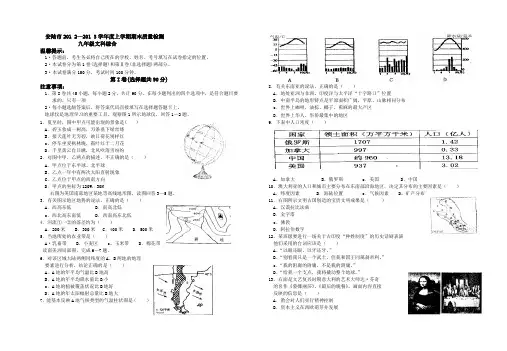
安陆市201 2—201 3学年度上学期期末质量检测九年级文科综合温馨提示:1·答题前,考生务必将自己所在的学校、姓名、考号填写在试卷指定的位置。
2·本试卷分为第1卷(选择题)和第Ⅱ卷(非选择题)两部分。
3·本试卷满分150分,考试时间100分钟。
第I卷(选择题共90分)注意事项:1.第I卷共45小题,每小题2分,共计90分。
在每小题列出的四个选项中,是符合题目要求的。
只有一项2·每小题选龃答案后,将答案代码直接填写在选择题答题卡上。
地球仪是地理学习的重要工具。
观察图1所示地球仪,回答1—2题。
1.夏至时,图中甲点可能出现的景象是( )A.碧玉妆成一树高,万条垂下绿丝绦B.接天莲叶无穷碧,映日荷花别样红c,停车坐爱枫林晚,霜叶红于二月花D.千里黄云自日曛,北风吹落雪纷纷2.对图中甲、乙两点的描述,不正确的是()A.甲点位于东半球、北半球B.乙点一年中有两次太阳直射现象C.乙点位于甲点的西南方向D.甲点的坐标为120W,30N右图为美国南部地区某地等高线地形图,读图回答3—5题。
3.有关图示地区地势的说法,正确的是()A.西高东低 B.南高北低c.西北高东南低 D.西南高东北低4.河流①一②的落差约为()A.200米 B.300米 C.400米 D.500米5.当地所处的农业带是()A·乳畜带 B.小麦区 c,玉米带 D.棉花带读南美洲局部图,完成6—7题。
6.对该区域大陆两侧同纬度的A、B两地的地理要素进行分析,结论正确的是()A.A地的年平均气温比B地高B.A地的年平均降水量比B小c.A地的植被覆盖状况比B地好D.A地的年太阳幅射总量比B地大7.能基本反映A地气候类型的气温柱状图是()8.有关东南亚的说法,正确的是()A.地处亚洲与非洲、印度洋与太平洋“十字路口”位置B.中南半岛的地形特点是平原面积广阔,平原、山脉相问分布c.世界上咖啡、油棕、椰子、蕉麻的最大产区D.世界上华人、华侨最集中的地区9.下表中人口密度()A.加拿大 B.俄罗斯 c.美国 D.中国10.澳大利亚的人口和城市主要分布在东南部沿海地区,决定其分布的主要因素是() A,纬度因素 B.海陆位置 c.气候因素 D。
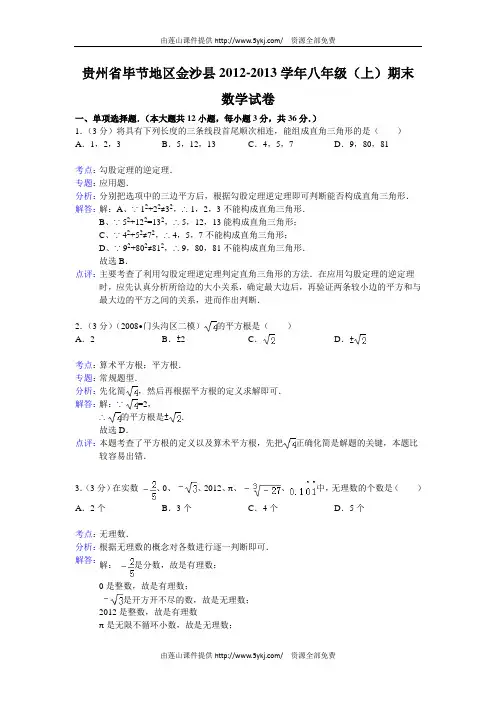
贵州省毕节地区金沙县2012-2013学年八年级(上)期末数学试卷一、单项选择题.(本大题共12小题,每小题3分,共36分.)±,然后再根据平方根的定义求解即可.:∵=2∴±题考查了平方根的定义以及算术平方根,先把3.(3分)在实数、0、、2012、π、、中,无理数的个数是()是分数,故是有理数;=﹣3,﹣3是整数,故是有理数;B=2﹣=9.(3分)将△ABC的三个顶点坐标的横坐标和纵坐标都乘以﹣1,则所得图形与原图形的11.(3分)(2005•杭州)已知一次函数y=kx﹣k,若y随x的增大而减小,则该函数的图象,,二、填空题.(本大题共6小题,每小题3分,共18分.)13.(3分)计算=.)﹣)﹣..14.(3分)一次函数y=﹣x+1与x轴,y轴所围成的三角形的面积是.则三角形的面积为.故答案为15.(3分)如果一次函数y=kx+b经过点A(1,3),B(﹣3,0),那么这个一次函数解析式为.∴y=x+x+.16.(3分)点P(a+5,a﹣1)是第四象限的点,且到x轴的距离为2,那么P的坐标为(4,﹣2).17.(3分)如图,已知∠EAD=32°,△ADE绕着点A旋转50°后能与△ABC重合,则∠BAE= 18度.18.(3分)如图;在等腰梯形ABCD中,AD=2,BC=4,DC=,高DF=2.=1,=三、解答或证明题.(本大题共6小题,各题分值见题后,共46分.)19.(6分)化简:..20.(6分)解方程组:.解:原方程组可化为故此方程组的解为21.(8分)如图,在平面直角坐标系xOy中,四边形OABC的顶点A在x轴上;∠COA=∠B=60°,且CB∥OA.(1)求证,四边形OABC是平行四边形.(2)若A的坐标为(8,0),OC长为6,求点B的坐标..则)322.(8分)如图,▱ABCD的两条对角线AC和BD相交于点O,并且BD=4,AC=6,BC=.(1)AC与BD有什么位置关系?为什么?(2)四边形ABCD是菱形吗?为什么?23.(8分)某学校初二级甲、乙两班共有学生150人,他们的期末考试数学平均分为64.4分,若甲班学生平均分为72分,乙班学生平均分为57分,那么甲、乙两班各有学生多少人?,.24.(10分)学校准备购买一批乒乓球桌.现有甲、乙两家商店卖价如下:甲商店:每张需要700元.乙商店:交1000元会员费后,每张需要600元.设学校需要乒乓球桌x张,在甲商店买和在乙商店买所需费用分别为y1、y2元.(1)分别写出y1、y2的函数解析式.(2)当学校添置多少张时,两种方案的费用相同?(3)若学校需要添置乒乓球桌20张,那么在那个商店买较省钱?说说你的理由.。
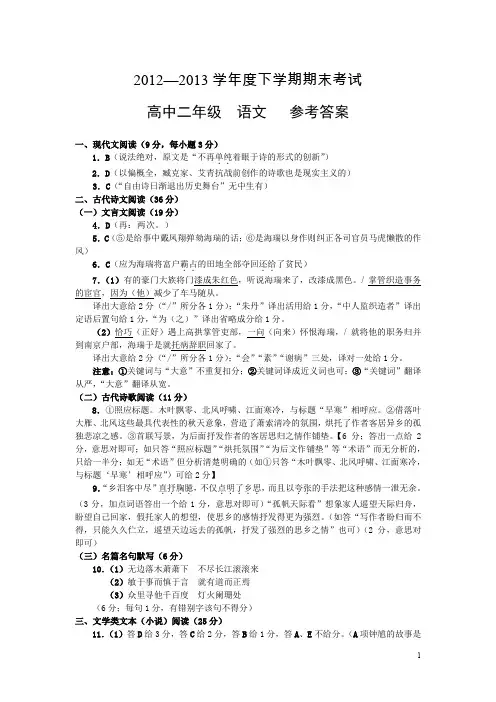
2012—2013学年度下学期期末考试高中二年级语文参考答案一、现代文阅读(9分,每小题3分)1.B(说法绝对,原文是“不再单纯..着眼于诗的形式的创新”)2.D(以偏概全,臧克家、艾青抗战前创作的诗歌也是现实主义的)3.C(“自由诗日渐退出历史舞台”无中生有)二、古代诗文阅读(36分)(一)文言文阅读(19分)4.D(再:两次。
)5.C(⑤是给事中戴凤翔弹劾海瑞的话;⑥是海瑞以身作则纠正各司官员马虎懒散的作风)6.C(应为海瑞将富户霸占..了贫民)..的田地全部夺回还给7.(1)有的豪门大族将门漆成朱红色,听说海瑞来了,改漆成黑色。
/ 掌管织造事务的宦官,因为(他)减少了车马随从。
译出大意给2分(“/”所分各1分);“朱丹”译出活用给1分,“中人监织造者”译出定语后置句给1分,“为(之)”译出省略成分给1分。
(2)恰巧(正好)遇上高拱掌管吏部,一向(向来)怀恨海瑞,/ 就将他的职务归并到南京户部,海瑞于是就托病辞职回家了。
译出大意给2分(“/”所分各1分);“会”“素”“谢病”三处,译对一处给1分。
注意:①关键词与“大意”不重复扣分;②关键词译成近义词也可;③“关键词”翻译从严,“大意”翻译从宽。
(二)古代诗歌阅读(11分)8.①照应标题。
木叶飘零、北风呼啸、江面寒冷,与标题“早寒”相呼应。
②借落叶大雁、北风这些最具代表性的秋天意象,营造了萧索清冷的氛围,烘托了作者客居异乡的孤独悲凉之感。
③首联写景,为后面抒发作者的客居思归之情作铺垫。
【6分;答出一点给2分,意思对即可;如只答“照应标题”“烘托氛围”“为后文作铺垫”等“术语”而无分析的,只给一半分;如无“术语”但分析清楚明确的(如①只答“木叶飘零、北风呼啸、江面寒冷,与标题‘早寒’相呼应”)可给2分】9.“乡泪客中尽”直抒.....,而且以夸张..的手法把这种感情一泄无余。
..胸臆..,不仅点明了乡思(3分,加点词语答出一个给1分,意思对即可)“孤帆天际看”想象家人遥望天际归舟,盼望自己回家,假托家人的想望,使思乡的感情抒发得更为强烈。
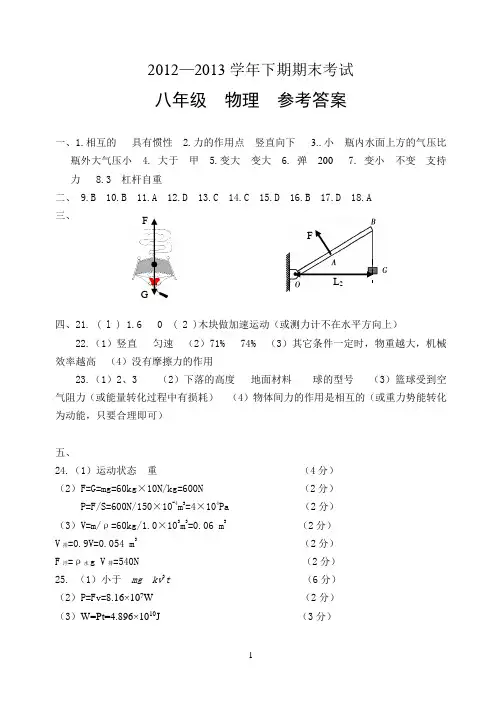
1 2012—2013学年下期期末考试
八年级 物理 参考答案
一、1.相互的 具有惯性 2.力的作用点 竖直向下 3..小 瓶内水面上方的气压比瓶外大气压小 4. 大于 甲 5.变大 变大 6. 弹 200 7. 变小 不变 支持力 8.3 杠杆自重
二、 9.B 10.B 11.A 12.D 13.C 14.C 15.D 16.B 17.D 18.A 三、
四、21. ( l ) 1.6 0 ( 2 )木块做加速运动(或测力计不在水平方向上)
22.(1)竖直 匀速 (2)71% 74% (3)其它条件一定时,物重越大,机械效率越高 (4)没有摩擦力的作用
23.(1)2、3 (2)下落的高度 地面材料 球的型号 (3)篮球受到空气阻力(或能量转化过程中有损耗) (4)物体间力的作用是相互的(或重力势能转化为动能,只要合理即可)
五、
24.(1)运动状态 重 (4分)
(2)F=G=mg=60kg ×10N/kg=600N (2分)
P=F/S=600N/150×10-4m 3=4×104Pa (2分)
(3)V=m/ρ=60kg/1.0×103m 3=0.06 m 3 (2分)
V 排=0.9V=0.054 m 3 (2分)
F 浮=ρ水
g V 排=540N (2分) 25. (1)小于 mg kv 3t (6分)
(2)P=Fv=8.16×107W (2分)
(3)W=Pt=4.896×1010J (3分)
F G F
L 2。

考号班级姓名700103李倩700205公宸700301王雨晴700404高洁700502李祥龙700606张平700703张德润700805单晓雯700901朱良翠701004张胜男701102付美玲701206袁文瑜701303王金红701405张丽梅701501英奇701604张在美701706高玉洁701803赵瑛琳701902张永702005张学成702101公彦蕾702206胡军702304李小芳702403张在起702502张倩702605刘启文702701王欣702806公晋702903王菲703004公丽703102张辉703205张娜703306武文慧703403武丽伟703501公彦凤703604王世林703702李召伟703806杨美钰703905郑丕庆704003孙涛704101张立洁704204邱彦东704302刘晓文704406武凯艳704503张国庆704605齐明刚704701公雪704804王梦鑫704902王涵705006张浩705103韩明秀705205任景辉705301朱维涛705404王文源705502张德文705606邱彦昊705703张丽705805张学英705901魏玲706004张涛706102都雨飞706206张彩霞706303张营706405张阳706501张宏伟706604杨道鑫706706张旭706803齐元伟706902王清菊707005王建平707101武林707206安诗晴707303公衍杰707404张维斌707502张佳丽707605刘艳707706武雪707801张伟707903刘霞708004王勇708102武晓萌708205李慧708306李敏708403公梦菲708501武玉妹708604韩腾708702王小燕708806许红兵708903张芹709005刘豪709101齐菲709204王智慧709302李红霞709406李玉709503张岩709605张在勇709701韩笑709804张湄雪709902张莹710006武庆龙710103公旭旺710205公茂强710301张浩710404杨雪710502赵兴710606公晓晴710703李明月(小) 710805公菲710901苗凤杰711004齐盛浩711106杨莹711202李帆711303袁海东711405张维增711501李明月711604刘琪711706张梦燕711803公磊711902张德祥712005张凤712101刘鑫712206张超712303王晓丽712404李富东712502王现金712605张德志712706袁俊亭712803齐玉秀712901李彬713004齐金凤713102张玉慧713206王栋713305公丕强713403王存萍713501王维花713604袁茂伟713702张强713806李竣敏713903刘元杰714005张鑫714101齐艳红714204张娜714302张霞714406王鑫714503葛锦涛714605武永辉714701武冠男714804张雪(小) 714902赵西浩715006苏航715103公紫慧715205王君715301王颜强715404林绪715502付君715606张敏715703王同715805张维杰715901张鑫716004朱琳716106牛云716203张为荣716302徐超716405安晨716501王建国716606公彦云716704公倩716803齐红716902魏公明717005张娜717101姜立娜717206张晓娜717303包西玮717404齐美荣717502杨道伟717605张玉红717706陈东方717803王龙民717901单开伟718004王金凤718102张聪聪718206公政宇718303武丽君718405王丽(小) 718501孙勤雨718604赵君718702王富迎718806张旭718903杨雪719005李红719101赵访719204范丽丽719302刘富存719406牛龙719503韩业欣719605齐明建719701许红生719804王钰719902牛蕾720006王维龙720103张文会720205公维玲720301付书梅720404齐明琰720506付英辉720602刁霞720703齐真真720805张在龙720901刘涛721004张婷721106朱迎基721203张伟鑫721302阚红红721405张鹏721501张维强721606胡杰721703郝立涛721804赵洋洋721902公欣722005张新华722106张玉凤722201武永萍722303单开强722404付贵722502张权722605葛平伟722706齐团元722803王萍722901宗文华723004张海723102朱维英723206王明723303张晓东723405张洁723501秦昌运723604张图鑫723702张雪723806王丽燕723903王鑫724005张德坤724101王升鹏724204刘娜724302公维春724406闫红724503公茂坤724605王为鑫724701王志强724804张德磊724902李敏725006王强725103刁远鹏725205郭成亮725301公彦全725404马云龙725506刘勇725603李琦725702张伟725805公培强725901李军726006徐雪726104张雨726203张勇726302刘晓芸726405付瑶726501齐姗姗726606公忆凯726703杨凯强726804张琪726902杨美毓727005张海波727106武光帅727203张金龙727301杨萍727404张涛727502包西亮727606武洁727705齐春洋727803徐小明727901王军728004张鹏728102张海芹728206都君安728303张路东728405公衍萍728501孙勤杰728604刘凯728702齐春永728806公彦亭728903张超729005张杰729101单付豪729204王朕民729302张昊天729406周小龙729505张磊729601刘敏729704张霞729802杨茂松729905张振华730004张明宇。
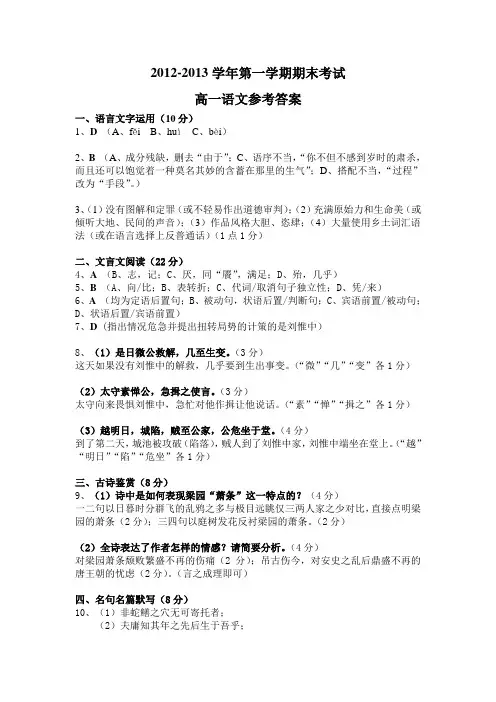
2012-2013学年第一学期期末考试高一语文参考答案一、语言文字运用(10分)1、D(A、fěi B、huìC、bèi)2、B(A、成分残缺,删去“由于”;C、语序不当,“你不但不感到岁时的肃杀,而且还可以饱觉着一种莫名其妙的含蓄在那里的生气”;D、搭配不当,“过程”改为“手段”。
)3、(1)没有图解和定罪(或不轻易作出道德审判);(2)充满原始力和生命美(或倾听大地、民间的声音);(3)作品风格大胆、恣肆;(4)大量使用乡土词汇语法(或在语言选择上反普通话)(1点1分)二、文言文阅读(22分)4、A(B、志,记;C、厌,同“餍”,满足;D、殆,几乎)5、B(A、向/比;B、表转折;C、代词/取消句子独立性;D、凭/来)6、A(均为定语后置句;B、被动句,状语后置/判断句;C、宾语前置/被动句;D、状语后置/宾语前置)7、D (指出情况危急并提出扭转局势的计策的是刘惟中)8、(1)是日微公救解,几至生变。
(3分)这天如果没有刘惟中的解救,几乎要到生出事变。
(“微”“几”“变”各1分)(2)太守素惮公,急揖之使言。
(3分)太守向来畏惧刘惟中,急忙对他作揖让他说话。
(“素”“惮”“揖之”各1分)(3)越明日,城陷,贼至公家,公危坐于堂。
(4分)到了第二天,城池被攻破(陷落),贼人到了刘惟中家,刘惟中端坐在堂上。
(“越”“明日”“陷”“危坐”各1分)三、古诗鉴赏(8分)9、(1)诗中是如何表现梁园“萧条”这一特点的?(4分)一二句以日暮时分群飞的乱鸦之多与极目远眺仅三两人家之少对比,直接点明梁园的萧条(2分);三四句以庭树发花反衬梁园的萧条。
(2分)(2)全诗表达了作者怎样的情感?请简要分析。
(4分)对梁园萧条颓败繁盛不再的伤痛(2分);吊古伤今,对安史之乱后鼎盛不再的唐王朝的忧虑(2分)。
(言之成理即可)四、名句名篇默写(8分)10、(1)非蛇鳝之穴无可寄托者;(2)夫庸知其年之先后生于吾乎;(3)则递三世可至万世而为君,谁得而族灭也;(4)遥想公瑾当年,小乔初嫁了;(5)则孤陋而寡闻;(6)苟利国家生死以。
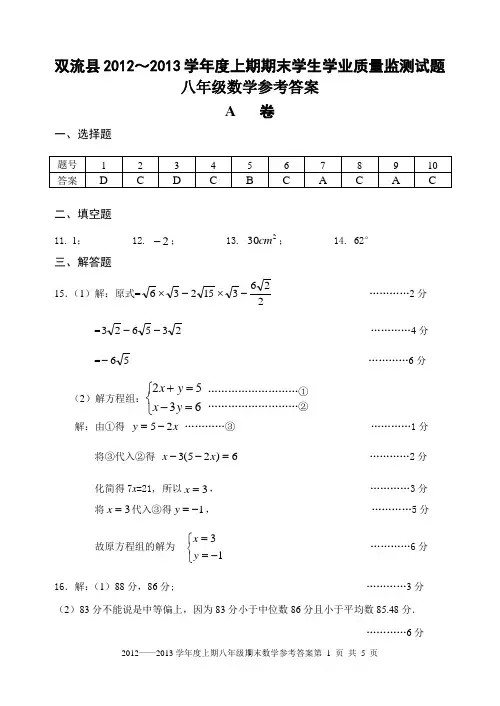
双流县2012~2013学年度上期期末学生学业质量监测试题八年级数学参考答案A 卷一、选择题二、填空题11. 1; 12. 2-; 13. 230cm ; 14. 62°三、解答题15.(1)解:原式=226315236-⨯-⨯ …………2分 =235623-- …………4分 =56- …………6分解:由①得 x y 25-= …………③ …………1分将③代入②得 6)25(3=--x x …………2分 化简得7x =21, 所以3=x , …………3分 将3=x 代入③得1-=y , …………5分故原方程组的解为 ⎩⎨⎧-==13y x …………6分16.解:(1)88分,86分; …………3分 (2)83分不能说是中等偏上,因为83分小于中位数86分且小于平均数85.48分.…………6分………………………①………………………②(2)解方程组:⎩⎨⎧=-=+6352y x y x17.解:(1)∵在△ABC 中, A (-1,5),B (-1,0),C (-4,3).∴点C 到边AB 的距离为3个单位即在△ABC 中,AB 边上的高3=h 而AB=5 ∴215352121=⨯⨯=⋅⋅=∆h AB S ABC . …………3分 (2)作图△A 1B 1C 1略. …………5分写出点A 1,B 1,C 1的坐标为:A 1(2,3),B 1(2,-2),C 1(-1,1) …………8分 18.解:设小刚家9、10两月各行驶了x 、y 千米. …………1分依题意,得⎪⎩⎪⎨⎧=+-=2601.01.010054y x x y …………5分 解得⎩⎨⎧==11001500y x …………7分答:小刚家9月份行驶1500千米,101月份行驶了1100千米. …………8分 19. 解:(1)证明如下:∵四边形ABCD 为等腰梯形,且AD ∥BC∴∠BAC=∠ADF ,AB=DC …………2分 又∵AD=DC ,DE=CF∴BA=AD ,AE=DF …………3分 ∴△BAE ≌△ADF …………4分 ∴AF=BE …………5分 (2)∠BPF=120°.证明如下: …………6分 ∵四边形ABCD 为等腰梯形,且AD ∥BC , ∠C=60°∴∠BAE=∠CDA=120° …………7分又∵△BAE ≌△ADF∴∠EBA=∠FAD …………8分 ∴∠EBA+∠FAB=∠BAE=120° …………9分 又∵∠EBA+∠FAB+∠BPA=180°=∠BPF+∠BPA∴∠BPF=∠EBA+∠FAB =120° …………10分 20.解:(1)观察图像可知,1小时后,两车相距240米-40米=200米.…………2分 (2)设l 1的表达式为b kt s +=1,观察图像可知,点(0,300)和(1,240)在其函数图像上,所以有⎩⎨⎧=+=240300b k b 解得:⎩⎨⎧-==60300k b所以,300601+-=t s . …………5分对于l 2,有t s 402=. …………7分 (3)当甲、乙两车相遇时,有21s s =,即 t t 4030060=+- 解得:3=t所以,行驶3小时候,甲、乙两车相遇. …………10分B 卷一、填空题21. ±4; 22. 3; 23. 25,25;24. (0,625)或(8250,); 25. ②③ 二、解答题26.解:(1)AE ′=BF .证明如下: …………1分如图2所示,在正方形ABCD 中, ∵ AC ⊥BD∴∠''F OE =∠AOD =∠AOB =90°即∠AOE ′+∠AOF ′=∠BOF ′+∠AOF ′ ∴∠AOE ′=∠BOF ′又∵OA =OB =OD ,OE ′=2OD ,OF ′=2OA ∴OE ′=OF ′∴△OAE ′≌△OBF ′∴AE ′=BF …………4分 (2)作△AOE ′的中线AM ,如图3. 则OE ′=2OM =2OD =2OA ∴OA =OM∵α=30°∴∠AOM =60°∴△AOM 为等边三角形∴MA =MO =ME ′,∠'AE M =∠'E AM 又∵∠'AE M +∠'E AM =∠AMO 即2∠'AE M =60° ∴∠'AE M =30°∴∠'AE M +∠AOE ′=30°+60°=90°∴△AOE ′为直角三角形. …………8分27.解:(1)过点P 作作PE ⊥x 轴,PF ⊥y 轴 ∵点P 的坐标为(2,p ) ∴PF=2又∵点C 的坐标为(0,2) ∴OC=2 ∴2222121=⨯⨯=⋅=∆PF OC S COP(2)∵6=∆AOP S ,2=∆COP S ∴421=⋅=∆CO AO S AOC ∴AO=4∴点A 的坐标为(-4,0) 又∵621=⋅=∆PE AO S AOP , ∴PE=3 ∴p =3. …………6分 (3)设直线BD 的函数表达式为b kx y +=,则点D 的坐标为(0,b ),点B 的坐标为(kb-,0) …………7分 ∵DOP BOP S S ∆∆=∴OD·PF=OB·PE ,即k b b -=32, ∴23=k …………8分 又∵点P (2,3)在直线BD 上,∴32=+b k∴⎪⎩⎪⎨⎧=+=3223b k k , 解得⎪⎩⎪⎨⎧==023b k (舍去)或⎪⎩⎪⎨⎧=-=623b k …………9分所以,直线BD 的函数表达式为623+-=x y . …………10分28.解:(1)①证明四边形AFCE 为菱形过程如下:∵四边形ABCD 是矩形 ∴AD ∥BC∴CAD ACB ∠=∠,AEF CFE ∠=∠∵EF 垂直平分AC ,垂足为O ∴OA OC =∴AOE ∆≌COF ∆, ∴OE OF = ∴四边形AFCE 为平行四边形 又∵EF ⊥AC∴四边形AFCE 为菱形 …………2分 ②设菱形的边长AF=CF=x cm ,则BF=(8﹣x)cm 在Rt △ABF 中, AB=4cm 由勾股定理得222)8(4x x =-+,解得5=x∴5AF cm = …………4分 (2)①显然当P 点在AF 上时,Q 点在CD 上,此时A 、C 、P 、Q 四点不可能构成平行四边形;同理P 点在AB 上时,Q 点在DE 或CE 上,也不能构成平行四边形.因此只有当P 点在BF 上、Q 点在ED 上时,才能构成平行四边形∴以A 、C 、P 、Q 四点为顶点的四边形是平行四边形时,PC QA = ∵点P 的速度为每秒5cm ,点Q 的速度为每秒4cm ,运动时间为t 秒∴5PC t =,124QA t =- ∴5124t t =-,解得34=t∴以A 、C 、P 、Q 四点为顶点的四边形是平行四边形时, 34=t 秒. …………8分 ②由题意得,以A 、C 、P 、Q 四点为顶点的四边形是平行四边形时,点P 、Q 在互相平行的对应边上. 分三种情况:i)如图1,当P 点在AF 上、Q 点在CE 上时,AP CQ =,即12a b =-,得12a b += ii)如图2,当P 点在BF 上、Q 点在DE 上时,AQ CP =, 即12b a -=,得12a b += iii)如图3,当P 点在AB 上、Q 点在CD 上时,AP CQ =,即12a b -=,得12a b += 综上所述,a 与b 满足的数量关系式是12a b +=(0)ab ≠ …………12分图1图2图3。
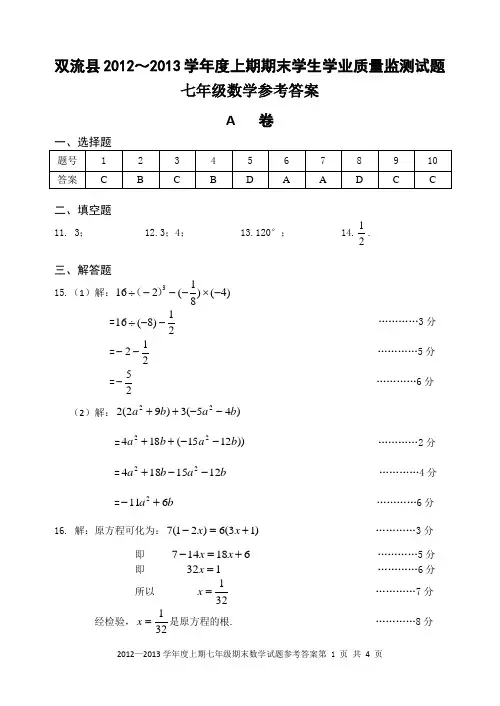
双流县2012~2013学年度上期期末学生学业质量监测试题七年级数学参考答案A 卷二、填空题11. 3; 12.3;4; 13.120°; 14.21.三、解答题15.(1)解:)4()81(2163-⨯---÷)(=21)8(16--÷ …………3分 =212-- …………5分 =25-…………6分 (2)解:)45(3)92(222b a b a --++=))1215(18422b a b a --++ …………2分=b a b a 121518422--+ …………4分 =b a 6112+- …………6分16. 解:原方程可化为:)13(6)21(7+=-x x …………3分即 618147+=-x x …………5分 即 132=x …………6分 所以 321=x …………7分 经检验,321=x 是原方程的根. …………8分17. 解:∵ C为AD 的中点, ∴ AC=21AD ,即AB+BC=21AD …………2分 ∴ 2AB+2BC=AD …………4分 又 ∵ BC -AB=14AD , ∴ 4BC -4AB=AD . …………6分 ∴ 2AB+2BC=4BC -4AB ,即BC=3AB . …………8分18. 解:(1)266人,38%; …………2分(2)259,补全条形统计图略: …………6分 (3)136.8°. …………8分19. 解:四边形ABCD 的对角线AC 与BD 的交点O ,是其内部到四个顶点的距离之和最小3的点.其理由如下: …………2分设点P 是四边形ABCD 内部异于点O 的点,则 (1)当点P 不在四边形ABCD 的对角线AC 与BD 上时∵两点之间直线段最短 ∴AP+PC >AC ,BP+DP >BD∴AP+PC+BP+DP >AC+BD …………4分 (2)当点P 在对角线AC 上,而不在BD 上时∵两点之间直线段最短 ∴AP+PC =AC ,BP+DP >BD∴AP+PC+BP+DP >AC+BD (6)(3)当点P 在对角线BD 上,而不在AC 上时∵两点之间直线段最短 ∴AP+PC >AC ,BP+DP =BD ∴AP+PC+BP+DP >AC+BD综上所述,当点P 是四边形ABCD 内部异于点O 的点时,它到四边形四个顶点的距离之和大于点O 到四边形四个顶点的距离之和.所以,点O 为所求的点. …………8分 (说明:本题参考答案是作为严格证明给出,若学生用文字语言说明理由,并且抓住最基本的数学道理“两点间线段最短”,由评卷教师酌情给分.)20.解:(1)选择绕道而行。
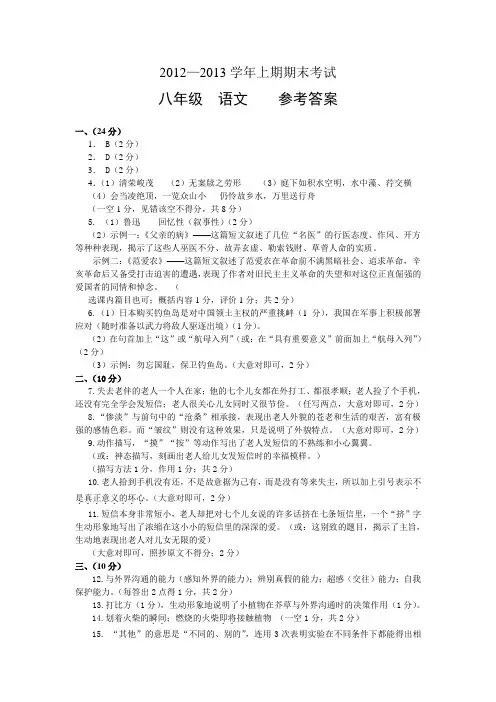
2012—2013学年上期期末考试八年级语文参考答案一、(24分)1. B(2分)2. D(2分)3. D(2分)4.(1)清荣峻茂(2)无案牍之劳形(3)庭下如积水空明,水中藻、荇交横(4)会当凌绝顶,一览众山小仍怜故乡水,万里送行舟(一空1分,见错该空不得分,共8分)5. (1)鲁迅回忆性(叙事性)(2分)(2)示例一:《父亲的病》——这篇短文叙述了几位“名医”的行医态度、作风、开方等种种表现,揭示了这些人巫医不分、故弄玄虚、勒索钱财、草菅人命的实质。
示例二:《范爱农》——这篇短文叙述了范爱农在革命前不满黑暗社会、追求革命,辛亥革命后又备受打击迫害的遭遇,表现了作者对旧民主主义革命的失望和对这位正直倔强的爱国者的同情和悼念。
(选课内篇目也可;概括内容1分,评价1分;共2分)6.(1)日本购买钓鱼岛是对中国领土主权的严重挑衅(1分),我国在军事上积极部署应对(随时准备以武力将敌人驱逐出境)(1分)。
(2)在句首加上“这”或“航母入列”(或:在“具有重要意义”前面加上“航母入列”)(2分)(3)示例:勿忘国耻,保卫钓鱼岛。
(大意对即可,2分)二、(10分)7.失去老伴的老人一个人在家;他的七个儿女都在外打工、都很孝顺;老人捡了个手机,还没有完全学会发短信;老人很关心儿女同时又很节俭。
(任写两点,大意对即可,2分)8.“惨淡”与前句中的“沧桑”相承接,表现出老人外貌的苍老和生活的艰苦,富有极强的感情色彩。
而“皱纹”则没有这种效果,只是说明了外貌特点。
(大意对即可,2分)9.动作描写,“摸”“按”等动作写出了老人发短信的不熟练和小心翼翼。
(或:神态描写,刻画出老人给儿女发短信时的幸福模样。
)(描写方法1分,作用1分;共2分)10.老人拾到手机没有还,不是故意据为己有,而是没有等来失主,所以加上引号表示不.是真正意义的坏心........。
(大意对即可,2分)11.短信本身非常短小,老人却把对七个儿女说的许多话挤在七条短信里,一个“挤”字生动形象地写出了浓缩在这小小的短信里的深深的爱。
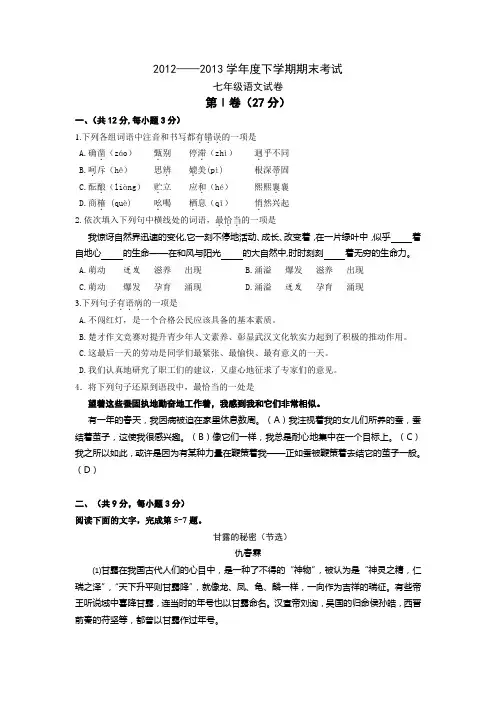
2012——2013学年度下学期期末考试七年级语文试卷第Ⅰ卷(27分)一、(共12分,每小题3分)1.下列各组词语中注音和书写都有错误...的一项是A.确凿.(záo)甄.别停滞.(zhì)迥.乎不同B.呵.斥(hē)思辨.媲.美(pì) 根深蒂.固C.酝酿.(l iàng)贮.立应和.(hã)熙熙襄.襄D.商榷. (quâ) 吆.喝栖.息(qī)悄.然兴起2.依次填入下列句中横线处的词语,最恰当...的一项是我惊讶自然界迅速的变化,它一刻不停地活动、成长、改变着,在一片绿叶中,似乎着自地心的生命——在和风与阳光的大自然中,时时刻刻着无穷的生命力。
A.萌动迸发滋养出现 B.涌溢爆发滋养出现C.萌动爆发孕育涌现D.涌溢迸发孕育涌现3.下列句子有语病...的一项是A.不闯红灯,是一个合格公民应该具备的基本素质。
B.楚才作文竞赛对提升青少年人文素养、彰显武汉文化软实力起到了积极的推动作用。
C.这最后一天的劳动是同学们最紧张、最愉快、最有意义的一天。
D.我们认真地研究了职工们的建议,又虚心地征求了专家们的意见。
4.将下列句子还原到语段中,最恰当的一处是望着这些蚕固执地勤奋地工作着,我感到我和它们非常相似。
有一年的春天,我因病被迫在家里休息数周。
(A)我注视着我的女儿们所养的蚕,蚕结着茧子,这使我很感兴趣。
(B)像它们一样,我总是耐心地集中在一个目标上。
(C)我之所以如此,或许是因为有某种力量在鞭策着我——正如蚕被鞭策着去结它的茧子一般。
(D)二、(共9分,每小题3分)阅读下面的文字,完成第5-7题。
甘露的秘密(节选)仇春霖⑴甘露在我国古代人们的心目中,是一种了不得的“神物”,被认为是“神灵之精,仁瑞之泽”,“天下升平则甘露降”,就像龙、凤、龟、麟一样,一向作为吉祥的瑞征。
有些帝王听说域中喜降甘露,连当时的年号也以甘露命名。
汉宣帝刘询,吴国的归命侯孙皓,西晋前秦的苻坚等,都曾以甘露作过年号。
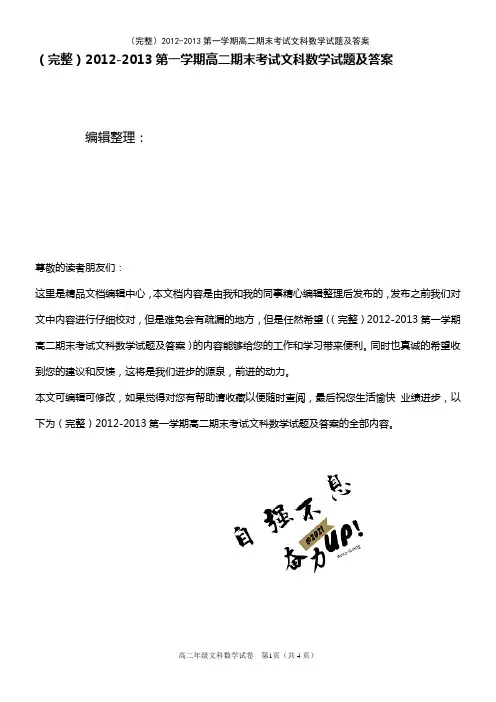
(完整)2012-2013第一学期高二期末考试文科数学试题及答案编辑整理:尊敬的读者朋友们:这里是精品文档编辑中心,本文档内容是由我和我的同事精心编辑整理后发布的,发布之前我们对文中内容进行仔细校对,但是难免会有疏漏的地方,但是任然希望((完整)2012-2013第一学期高二期末考试文科数学试题及答案)的内容能够给您的工作和学习带来便利。
同时也真诚的希望收到您的建议和反馈,这将是我们进步的源泉,前进的动力。
本文可编辑可修改,如果觉得对您有帮助请收藏以便随时查阅,最后祝您生活愉快业绩进步,以下为(完整)2012-2013第一学期高二期末考试文科数学试题及答案的全部内容。
第Ⅰ卷 选择题(共50分)一、选择题:本大题共10小题,每小题5分,共50分,在每小题给出的四个选项中,只有一项是符合题目要求的。
1.“0x >0>”成立的A .充分非必要条件B .必要非充分条件C .非充分非必要条件D .充要条件 2.抛物线24x y =的焦点坐标是A .(1,0)B .(0,1)C .1(,0)16D .1(0,)163.圆8)3()3(22=-+-y x 与直线3460x y ++=的位置关系是A .相交B .相切C .相离D .无法确定 4.设l 是直线,,αβ是两个不同的平面,则下列结论正确的是A .若l ∥α,l ∥β,则//αβB .若//l α,l ⊥β,则α⊥βC .若α⊥β,l ⊥α,则l ⊥βD .若α⊥β, //l α,则l ⊥β 5.已知命题p :∀x 1,x 2∈R ,(f (x 2)-f (x 1))(x 2-x 1)≥0,则⌝p 是A .∃x 1,x 2∈R ,(f (x 2)-f (x 1))(x 2-x 1)≤0B .∀x 1,x 2∈R ,(f (x 2)-f (x 1))(x 2-x 1)≤0C .∃x 1,x 2∈R ,(f (x 2)-f (x 1))(x 2-x 1)〈0D .∀x 1,x 2∈R,(f (x 2)-f (x 1))(x 2-x 1)〈06.若一个圆锥的侧面展开图是面积为π2的半圆面,则该圆锥的体积为A .2πB .3C .2D .4π7.已知椭圆2215x y m+=的离心率e =m 的值为A .3B ..253或3 8.如图,在正方体1111ABCD A B C D -中, 直线1C B 与1D C 所成角为A .030B .045C .0609.一个体积为 则这个三棱柱的左视图的面积为A .36B .8C .38D .1210.已知双曲线22214x y b-=的右焦点与抛物线y 2=12x 的焦点重合,则该双曲线的焦点到其渐近线的距离等于A 。
What happened to that brilliant idea that you once had?Did you ignore(忽略)it because you thought that it was just a little thought?Have you ever considered what that little thought would have become if you had acted on your instincts(本能) or if you had more attention to it?Imagine a scene,where you are sitting at home watching television or reading a book,suddenly a light bulb is turned on in the dark tunnel of your mind as a thought or an idea crosses your mind.The thought catches your attention but seems so meaningless and you want to give it up,but wait a minute!That thought could be the potential(潜在的) beginning of the success you have wanted so much.As the thought crosses your mind,your senses become alert and you suddenly see a possibility, a possibility,a realization,a solution,a conclusion,or find the answer to a problem whose solution has long escaped from you.It is almost as if a great being has spoken the perfect solution quietly into your ear or awakened your senses to a reality by this means bringing light to your life.It is like finding the last piece of jigsaw puzzle.This becomes an AHA moment and everything freezes around you as you excitedly try to grasp the practicability of that little but powerful thought.Y our self-confidence and interest increase as you become aware of the great possibilities that can arise if that little thought is acted upon.This becomes the moment to build upon that thought and write down any ideas that are steaming from that little thoughts for later review.Seemingly meaningless little thought or ideas when acted upon have a potential to burst into a great projects. Many successful projects have been born from the little positive thoughts that were carefully nurtured(培育) and recognised as tickets to great things.Y ou may have heard people say many times it just comes to me in a flash moment, a small idea or seemingly meaningless thought may cross your mind about something you have been planning to complete.Don’t waste an opportunity to act on a potentially brilliant idea.Y ou don’e have to wait for a major peer(同伴) for a major idea,a master strategy or agrement from your peers In order for you to act on the little thought.This little thought or idea is the beginning of the great things if you decide to follow it.57.In paragraph 3 ,“an AHA moment ”refers to the moment that________.A.you suddenly understand and find somethingB.you get the agreement from your peersC.a thought or an idea crosses from your mindD.A light bulb is turned on in the dark58.What is the best tittle for the passage?A.Can Y ou Catches Y our Chances?B.Are Y ou Ignoring Y our Little Thought?C.Little thought in the leisure timeD.How to use of the little thought?59.What does the writer want to tell us?A.little thoughts help increase the interest for your job.B.Think over the little thought for the little great invention.C.Many successful projects have been born in your dreams.D.Act on the little thoughts because they might lead to the great things.。
2012—2013学年第二学期期末考试参考答案及评分标准
高二地理
一、单项选择
二、综合题:(共40分)
31(1)左图反映出长江流域水土流失严重,导致河流含沙量增大,河床淤积,洪水增多(2分);右图中反映出湖泊面积缩小,导致调蓄洪水能力降低,洪水增多(2分);洪水增多也可造成水土流失加剧,湖泊面积进一步缩小(2分)。
(2)退田还湖(2分);加强河流上游的水土保持(2分)。
32(10分) 原因:镉为重金属元素,对人体及生态的危害大;此次污染浓度大;正值冬季,河流水量小,稀释作用弱;下游沿岸人口密度大。
(每点2分,任答3点即可)
作用:水坝主要通过截流和稀释,减小对下游的影响;(4分)
33(1)1月中旬:自西南向东北(自西向东)干旱等级降低 3月中旬:自中间向南北两侧干旱等级降低(干旱等级中间高,南北两侧低)。
(4分)
(2)降水较常年偏少(降水减少50%以上);气温较常年偏高,蒸发量大(气温偏高2℃);干旱持续时间长,夏秋冬春四季连旱;喀斯特地貌,地表水渗漏严重.地表水缺乏。
(每点2分,任答3点即可)
34(1)主要分布在山区(2分);来自大西洋、北冰洋的水汽,遇山地抬升,形成降雪(2分)(2)大量融雪易使河水暴涨,形成洪水灾害(2分);大量雪水易在山区形成滑坡、泥石流(2分);融水冲刷土壤形成水土流失,土壤肥力降低(2分)。
2012学年第一学期各区县期末考试句型转换分类一、否定句1. You’d better do your homework in a hurry. (改为否定句)You’d better _________ your homework in a hurry.2. Jack goes to the club to practise playing tennis every Saturday afternoon. (改为否定句)Jack ________ ________ to the club to practise playing tennis every Saturday afternoon.3. Many students in our school have already read the novels by Mo Yan. (改为否定句)Many students in our school have _________ read the novels by Mo Yan __________.4. Sophie has a badminton lesson every Friday. (改为否定句)Sophie _______ _______ a badminton lesson every Friday.5. Tim had to lie down for a while to rest his legs. (改为否定句)Tim _________ _________ to lie down for a while to rest his legs.6. You’d better do your shopping online without visiting an actual shop.(改为否定句) You’d better ________ ________ your shopping online without visiting an actual shop7. Tom goes to school on foot every morning. (改为否定句)Tom ________ ________ to school on foot every morning.8. Peter went on a three-day study trip to Nanjing last month. (改为否定句)Peter ________ ________ on a three-day study trip to Nanjing last month.二、一般疑问句1. Tom knows something about the players of our school football team. (改为一般疑问句)____________ Tom____________anything about the players of your school football team?2. More and more animals will die if we don’t improve our environment. (改为一般疑问句)_______ more and more an imals _______ if we don’t improve our environment?3. My son used to do some reading before going to bed. (改为一般疑问句)________ your son ________ to do some reading before going to bed?4. Jonny read a lot of reviews on poems written by Shakespeare when he was in Britain.(改为一般疑问句) _____ Jonny ____ a lot of reviews on poems written by Shakespeare when he was in Britain?5. Susan played the violin in front of her schoolmates a week ago. (改为一般疑问句)_______ Susan ________ the violin in front of her schoolmates a week ago?6. He put many flowers on the table. (改为一般疑问句)he many flowers on the table?7. Use of computers spread rapidly during that period. (改为一般疑问句)________ use of computers ________ rapidly during that period?8. The government tried to find some ways to solve the pollution problem. (改为一般疑问句)________ the government ________ to find some ways to solve the pollution problem?三、对画线部分提问1. The boy goes to school on foot to save some money. (对划线部分提问)_________ _________ the boy go to school on foot?2. He interviewed some neighbours of hers in order to get information. (对划线部分提问)____________ ____________ he interview some neighbours of hers?3. My father will go to Hong Kong to attend a meeting in three days. (对划线部分提问)________ ________ will your father go to Hong Kong to attend a meeting?4. Susan finished typing the letter the most quickly in her class. (对划线部分提问)________ ________ Susan finish typing the letter in her class?5. Isabelle’s grandmother used to go to church once a week. (就划线部分提问)___________ ___________ times a week did Isabelle’s grandmother use to go to church?6. Little Lucy has learnt to play the piano since she was five years old. (就划线部分提问)________ ________ has little Lucy learnt to play the piano?7.I visit my grandparents with Mum and Dad once a week. (对划线部分提问)______ ______ do you visit your grandparents with Mum and Dad?8. Teachers always encourage students to practice more after class. (对划线部分提问)________ ________ teachers always encourage students to do?9. Mr. Yellow has been to Germany twice. (对划线部分提问)times has Mr. Yellow been to Germany.10. The new machine stayed underwater for three hours. (对划线部分提问)_______ _______ did the new machine stay underwater?11. Cormorant fishing is probably more than a thousand years old. (对划线部分提问)_________ _________ is cormorant fishing?12. Sir John Gurdon has been awarded the 2012 Nobel Prize in medicine or physiology for his workon cloning(克隆). (对划线部分提问)______ ______ Sir John Gurdon been awarded the 2012 Nobel Prize in medicine or physiology?13. People can get drinking water by taking away the salt from sea water. (对划线部分提问)__________ __________ people get drinking water?14. People help the victims of the earthquake through the Red Cross. (对划线部分提问)________ ________ people help the victims of the earthquake?15. They surfed the Internet to gather some information about the earthquake. (划线部分提问)________ ________ they surf the Internet?16. Jack tried to wake up his wife by ringing the door-bell. (对划线部分提问)________ ________ Jack try to wake up his wife?17. Her family moved to Tokyo about ten years ago. (对划线部分提问)_________ _________ her family move to Tokyo?四、被动语态1. Mary wrote an E-mail to her parents yesterday. (改为被动语态)An E-mail to her parents by Mary yesterday.2. Saint Claus hid the presents in the long stocking on Christmas Eve. (改为被动语态)The presents ____________ ___________ in the long stocking on Christmas by Saint Claus.3. Mary asked Tom to meet her friend at the airport at eight in the evening. (改为被动语态)Tom ________ ________ to meet Mary’s friend at the airport at eight in the evening.4. Jane wrote several articles about memory last month. (改为被动语态)Several articles about memory ________ ________ by Jane last month.5. Schools should offer more fruits and vegetables to students in their meals every day. (被动语态) More fruits and vegetables should ________ ________ to students in their meals every day.6. Mrs. Bush will allow me to take the exam even I missed so many lessons. (改为被动语态)I will _____ _____ to take the exam by Mrs. Bush even I missed so many lessons.7. Kitty expressed many thanks to her parents on Thanksgiving Day. (改为被动语态)Many thanks ________ ________ by Kitty to her parents on Thanksgiving Day.8. Chinese people invented black tea during the Ming Dynasty. (改成被动语态)Black tea by Chinese people during the Ming Dynasty.9. In the film a man with a gun broke into a small supermarket. (改为被动语态)In the film a small supermarket into by a man with a gun.10. The cartoonist has made the script into a finished comic strip. (改为被动语态)The script _________ _________ made into a finished comic strip by the cartoonist.11. Some shop owners use Christmas songs during the festive season to make us more careless withour money. (改为被动语态)Christmas songs ______ _____ to make us more careless with our money during the festive season.12. The postman delivers letters in the late afternoon every day. (改为被动语态)Letters ___________ __________ by the postman in the late afternoon every day.13. They collected some materials about an earthquake in Haiti. (改为被动语态)Some materials about an earthquake in Haiti _________ _________.14. Tom’s grandpa grows tomatoes in the field every year. (改为被动语态)Tomatoes ________ ________ by Tom’s grandpa in the field every year.15. The government will build a new school near our housing estate next year.(改为被动语态)A new school will ________ ________ near our housing estate next year.16. Our class teacher chose our monitor to take part in the English reading contest last week.(改为被动语态) Our monitor ________ _________ to take part in the English reading contest last week.五、感叹句1. Paul has made great progress in chemistry this term. (改为感叹句)__________ __________ progress Paul has made in chemistry this term!2. It was a very exciting week. (改为感叹句)__________ _________ exciting week it was!3. Mary is very warm-hearted. (改为感叹句)________ ________ warm-hearted girl Mary is!六、反义疑问句1. The government’s set up a new modern hospital for the farmers. (改为反意疑问句)The government’s set up a new modern hospital for the farmers, ?2. Gary’s parents seldom buy him name-brand sports shoes. (改为反意疑问句)Gary’s parents seldom buy him name-brand sports shoes, ________ ________ ?3. There is little time left for us to work out a solution. (改为反意疑问句)There is little time left for us to work out a solution, _________ ________?4. Uncle Michael has been a professional F1 driver for many years. (改为反意疑问句)Uncle Michael has been a professional F1 driver for many years, _______ ________?5. The shop owner was losing his customers because his staff worked slowly.(改反意疑问句)The shop owner was losing his customers because his staff worked slowly,?6. Sometimes best wishes hardly seem enough. (改为反意疑问句)Sometimes best wishes hardly seem enough, _________ _________?7. Your father has never been to Hong Kong. (改为反意疑问句)Your father has never been to Hong Kong, _________ _________?8. John’s told to be on time for the meeting. (改为反意疑问句)John’s told to be on time for the m eeting,______________ ______________?9. Psy (鸟叔) won Time Magazine’s Person of the Year Award. (改为反意疑问句)Psy won Time Magazine’s Person of the Year Award, ________ ________?10. The professor will give us a lecture on the effect of green house next Monday. (改反意疑问句)The professor will give us a lecture on the effect of green house next Monday, ______ _______?11. My brother has never seen so much snow before. (改为反意疑问句)My brother has never seen so much snow before, ________ ________?七、保持句意相同1. Detective Ken spent a week dealing with the case. (保持句意基本不变)Detective Ken a week to deal with the case.2. Be quick, or you can’t catch the bus. (保持句意基本不变)you quick, y ou can’t catch the bus.3. The box on the shelf is so heavy that the boy can’t carry it. (保持句意基本不变)The box on the shelf isn’t _____________ _____________ for the boy to carry.4. We will have a barbecue in the forest park if it doesn’t rain this Su nday. (保持句意不变)We will have a barbecue in the forest park __________ it __________ this Sunday.5. My daughter studies both singing and dancing in the kindergarten. (保持句意基本不变)My daughter studies singing ________ ________ as dancing in the kindergarten.6. The 30th Olympic Games were held in London in 2012. (保持句意基本不变)The 30th Olympic Games ________ ________ in London in 2012.7. Detective Ken did a lot about the case in order to find out the truth. (保持句意基本不变) Detective Ken did a lot about the case ________ ________ he could find out the truth.8. To do this job well, you need time, and you also need brains. (保持句意基本不变)To do this job well, you need time and brains ___________ __________.9. Sally spent about 625 dollars on the iPhone 4. (保持句意基本不变)Sally _________ 625 dollars _________ the iPhone 4.10. I prefer to sleep with the window wide open unless it’s really cold. (保持句意不变)I prefer to sleep with the window wide open ________ it ________ really cold.11. Remember to say sorry to others if you do something wrong. (保持句意不变)Remember to ________ ________ others if you do something wrong.12. Sitting up too late at night is harmful to our health. (保持句意基本不变)Sitting up too late at night is_________ _________ our health.13. Why didn’t you tell him the truth when he asked you about his illness? (保持句意基本不变)________ _________ tell him the truth when he asked you about his illness?14. The hardworking man went home after he finished all the work that day. (保持句意基本不变)The hardworking man _____ go home _____ he finished all the work that day.15. Yesterday my friend Charlie said sorry to me because he broke my glasses. (保持句意不变)Yesterday my friend Charlie ________ to me ________ breaking my glasses.16.We buy a special program in order to help the computer recognize our voice. (句意不变)We buy a special program ________ _______ it can help the computer recognize our voice. 17. Creating a comic strip is difficult. (保持句意不变)It’s difficul t a comic strip.18. This shelf is too small to hold all your books. (保持句意基本不变)This shelf is small it can’t hold all your books.19. Amy looks after the pets when her parents are away from home. (保持句意基本不变)Amy the pets when her parents are away from home.20. I was so lucky that I was in the right place at the right time. (保持句意基本不变)I was _________ _________ to be in the right place at the right time.21. We learn a language in order to communicate. (保持句意基本不变)We learn a language _________ _________ we can communicate.22. What would you like to ask besides this question? (保持句意基本不变)What would you like to ask _______ ________ to this question?23. A team of men spent a whole day moving the ancient building. (保持句意基本不变)_________ _________ a team of men a whole day to move the ancient building.24. I was the only person who was invited to the party. (保持原句意思)Nobody ___________ me ____________ invited to the party.25. We cannot predict the exact time and location of earthquake now. (保持句意基本不变)________ ________, we cannot predict the exact time and location of earthquake.26. Our monitor is too weak to play football any more. (保持原句意思)Our monitor is not ________ ________ to play football any more.27. Mr. Smith set out early for the airport so that he could catch his flight.(改为简单句)Mr. Smith set out early for the airport _________ _________ to catch his flight.28. We can go to the museum by bus. We can go there by underground instead.(保句意不变)We can go to the museum _________ by bus _________ by underground.八、合并成一句1. Lucy has been to Beijing. Mark has been to Beijing as well. (合并为一句)____________Lucy and Mark ____________been to Beijing.2. George didn’t do his homework. He watched TV news. (合并成一句)George watched TV news ________ ________ doing his homework.3. Sam didn’t go with his classmates for the party. He went to see a film alone. (合并为一句)Sam went to see a film alone ________ ________ going with his classmates for the party.4. The Korean pop music video Gangnam Style is very popular. Many people would like to learn thefunny dance. (合并两句)The Korean pop music video Gangnam Style is ________ popular ________ many people would like to learn the funny dance.5. We learn new words with pictures. We can remember them easily. (合并成一句)We learn new words with pictures we can remember them easily.6. Could you tell me? How can I deal with all these problems? (合并成复合句)Could you tell me how_________ _________ deal with all these problems?7. The water is warm. The baby can take a bath in it. (两句合并为一句简单句)The water is ____________ ____________ for the baby to take a bath in.8. We cannot drink sea water. We cannot take a shower with it, either. (合并为一句)We can ________ drink sea water ________ take a shower with it.9. The teacher didn’t answer my question. He asked me another question. (合并为一句)The teacher asked me another question ________ of ________ my question.九、改成宾语从句1. When will we take an English exam? We wanted to know. (改为宾语从句)We wanted to know we take an English exam.2. “Can you help me repair the bike?” Mary asked Jack. (改为宾语从句)Mary asked Jack _____________he _____________ help her repair the bike.3. When are we going to visit the museum? Do you know? (改为宾语从句)Do you know when _______ _______ going to visit the museum?4. Frank asked me, "Have you ever created a comic strip?" (改为宾语从句)Frank asked me whether ________ ________ ever created a comic strip.5. “Are there any new products for the European market?” The sales manager wanted to know. (改为宾语从句)The sales manager wanted to know ___ there ___ any new products for the European market.6. I wondered. Will Jack recognize me after such a long time? (改成宾语从句)I wondered ________ Jack ________ recognize me after such a long time.7. “Does anyone need my help with the school project?” The class teacher asked.(宾语从句)The class teacher asked _____ anyone _____ his help with the school project.8. Mrs. Lin asked me “Have you finished drawing the picture?” (改成宾语从句)Mrs. Lin asked me ________ I ________ finished drawing the picture.9. He asked: “How can I get to the Bund?” (改为间接引语)He asked he get to the Bund.10. “Is it the last bus to the city centre?” I asked the driver.(改成宾语从句)I asked the driver ________ it ________ the last bus to the city centre.11. “Mum, was the telephone invented by Bell?” the girl asked. (改为宾语从句)The girl asked her mum ________ the telephone ________ invented by Bell.12. “Do you always catch such an early train?” The policeman asked the man.(改为宾语从句)The policeman asked the man ________ he always ________ such an early train.。
2012年—2013学年第一学期期末考试高二年级历史(文科)试题注意事项:1.本试题分第I卷(选择题)和第II卷(非选择题)两部分。
2.答卷前,考生务必用黑色字迹的钢笔或签字笔将自己的姓名和考生号填写在答题卡和答题纸的密封装订线内,并用2B铅笔将答题卡相应的信息填涂准确。
3.选择题每小题选出答案后,用2B铅笔把答题卡上对应题目选项的答案信息点涂黑,如需改动,用橡皮擦干净后,再选涂其他答案,答案不能答在试卷上。
4.非选择题必须用黑色字迹钢笔或签字笔作答,直接写在答题页上,写在原题目处无效。
第Ⅰ卷选择题(共60分)一、选择题:本大题共30小题,每小题2分,计60分。
在每小题列出的四个选项中,只有一项符合题目要求。
1.春秋战国时代,诸子百家讲政治时大多站在民众一边,替百姓打算,唯有一家与其他各家不同,为君主参谋,专替君主打算。
这一家是()A.儒家 B.法家 C.道家 D.墨家2.清风吹动旗幡,一人说是风动,一人说是幡动。
禅宗六祖慧能说,不是风动,不是幡动,而是两位心动。
在世界的本原问题上,与慧能的观点有相似之处的思想家是()A. 孔子B. 程颢C. 朱熹D. 王阳明3. 朱熹提出“存天理,灭人欲”,其中“天理”主要是指()A.天体运行法则 B.社会发展规律C.封建道德规范和等级秩序 D.“天人感应”学说4.下列观点,体现了明末清初儒家思想的新发展的有()A.“天下为主,君为客” B.“心外无物,心外无理”C.“宇宙便是吾心,吾心既是真理” D.“父子君臣,天下之定理5.明末清初思想家黄宗羲的《明夷待访录》在清代被列为禁书,其主要原因是该书()A.将人性与天理对立起来 B.质疑孔子的权威性C.主张儒、佛、道三教合一 D.抨击君主专制制度6.古希腊人将神塑造为生动逼真的人的形象,这在一定程度上体现了古希腊的……( )A.民主思想B.无神论思想C.科学思想D.人文主义思想7.他曾为了追求真理,不顾自己的利益、职业和家庭,他是个哲学的殉道者。
2012-2013学年度第一学期期末考试七年级语文试卷第Ⅰ卷一、(本大题共14小题,共31分)以下选择题给出的四个选项中,只有一个最符合题意,请将其序号填到后面括号里。
1.下列句子中加点字的注音正确的一项是()(2分)A.我从石架向下望,感到头晕目眩.(xuán)。
B.一霎.(chà)间却又是乌云密布,大雨倾盆。
C.还有各种花的香,都在微微湿润的空气里酝.(yùn)酿。
D.这也真够滑稽.(jì),但是我决不能让人看出来。
2.下列各句中加点的成语,使用正确的一项是( )(2分)A.公交司机吴斌同志舍己救人的壮举,让获救的市民们耿耿于怀....,一生难忘。
B.虹山湖的山光水色,在濛濛细雨中,隐隐约约,美如仙境,引人..入胜..。
C.易中天老师在演讲中时时旁征博引,妙语连珠,简直令同学们目.不暇接...。
D.网球选手李娜从小就有自命不凡....的理想,这激励着她不断超越自己,成为亚洲网坛的骄傲。
3.结合语境,在下面语段中的横线处填写句子最恰当的一项是()(2分)每当寒冬腊月时节,雪打竹叶,①,声如春蚕进食;忽然“咔嚓”一声,一些毛竹被压折了。
雪霁天晴,毛竹们纷纷抖落压在身上的积雪,一个个站起来,七年级语文试卷第1页(共12页)②,英姿勃发,象是一排排列队的士兵。
A.①沙沙落雪彼此和应②抖擞精神B.①飘飘落雪安静轻柔②精神抖擞C.①沙沙落雪彼此和应②精神抖擞D.①飘飘落雪安静轻柔②抖擞精神4.下列选项中对文章内容分析有误的一项是()(2分)A.《在山的那边》这首诗叙述了一个山区孩子童年的幻想——对大海的热烈向往,长大后仍然不停地追求它。
B.《走一步,再走一步》作者是美国作家莫顿·亨特,本文是篇记叙文,回忆了“我”童年时一次脱险的经历,其中蕴涵了有关面对困难、战胜困难的生活哲理。
C.《紫藤萝瀑布》中一树盛开的紫藤萝花吸引了“我”,使“我”浮想联翩,原有的悲痛和焦虑化为宁静和喜悦,让“我”感悟到了生命的永恒。
2012-2013第一学期期末试题D篇归纳D(东城)―Hello.‖ — it is one of the first words we learn as babies, yet it‘s one of the last ones we think to use as adults. That‘s regrettable, because saying hello is more than just saying hello — it‘s the respect of another‘s worth. How might the world change — how might we change — if we have mastered this word? To find out, I spent one month saying hello to every person I met. Here‘s what I‘ve learnt.It can improve productivity. In one of the few studies ever done on this subject, Allan Allday, an assistant professor of special education at Oklahoma State University, had middle school teachers greet their students individually each morning. This exchange of greetings raised the kid‘s productivity. School went from impersonal to personal, and that led to more class participation(参与)and better grades.Environments influence friendliness. One study found that people in the city were less likely to shake hands with a stranger than those in the countryside. And, researchers say, pleasant environments generally encourage more smiles and hellos than unpleasant ones. My experience was similar. Whatever the reason, my hellos in the city were answered far less often than the ones in the countryside. Similarly, people in vacation areas, like the Jersey Shore, were far more friendly than those hurrying to work downtown.It‘s a form of health insurance(保险). It‘s impossible to say hello without smiling. And smiling has been shown to lower blood pressure, lighten unpleasant feelings and improve happiness. It seems that saying hello creates a similar influence.So maybe we can make the world a better place by saying hello. After a month of doing it, I feel lighter and more connected and I have a better sense of well-being.56. What can we know from the first paragraph?A. People can say hello since they are born.B. Saying hello is a way to show respect to others.C. People lose the ability to say hello when they grow up.D. Saying hello is a way to change the world completely.57. Which of the following is true according to the second paragraph?A. Students will get good grades by saying hello very often.B. An assistant professor likes greeting his students every morning.C. The teacher who often says hello to students is very popular at school.D. Kids will be more active in class by exchanging greetings with teachers.58. From the passage, we learn that ________.A. smiles can take the place of hellosB. people living in the city refuse to say helloC. environments play a role in creating friendlinessD. having health insurance is more important than saying hello59. The underlined word ―well-being‖ in the last paragraph means ________.A. health and happinessB. comfort and quietnessC. pride and confidenceD. peace and hopefulnessD(西城)―Sleep-disordered breathing (SDB)‖is a term for a group of conditions that can influence normal breathing while people sleep. These include snoring (打鼾), mouth-breathing and sleep apnea. Sleep-disordered breathing can do more than just leave people feeling tired the next day. It can also have an effect on people's health. In children the effects can include behavioral and emotional problems.In a new study, researchers asked parents about their children's breathing from when they were babies up to about age six. The study involved about eleven thousand children.Karen Bonuck at the Einstein College of Medicine in New York led the study. She says, ―The central finding overall is that sleep-disordered breathing is connected with a fifty percent increase in adverse neurobehavioral (不利的神经行为) outcomes.‖She adds that the more serious the breathing problems, the more serious the behavioral issues were likely to be. Other studies have linked sleep with children's behavior, but this study could be able to reject (排除) other possible causes.The study appears in the journal Pediatrics. It‘s estimated one child in ten snores regularly. A smaller number suffer (遭受) from other sleep-disordered breathing.How well do you sleep? A popular belief is that sleep gets worse with age. But, in another new study, those who reported the fewest problems with the quality (质量) of their sleep were people in their eighties.Researchers did a telephone survey of more than one hundred fifty thousand American adults. Michael Grandner at the University of Pennsylvania medical school says the starting goal was to prove that aging is connected with increased sleep problems.The survey did find an increase during middle age, worse in women than men. But except for that, people reported that their sleep quality improved as they got older. At least they felt it did.Mr. Grandner says, ―Even if sleep among older Americans is actually worse than in younger adults, feelings about it still improve with age.‖The findings appear in the journal Sleep. In the study, health problems and sadness were linked with poor sleep. Also, women reported more sleep disturbances and tiredness than men.But, based on the study, Mr. Grandner says older people who are not sick or depressed should be reporting better sleep. ―If they‘re not, they need to talk to their doctor. They shouldn‘t just take no notice of it,‖ he says. Nor should their doctor turn a blind eye to it. He says doctors generally dismiss sleep complaints (抱怨) from older adults as a normal part of aging.57. From the passage we can learn that ______.A. middle-aged men have more sleep problems than womenB. the older people get, the better the quality of sleep will beC. doctors don‘t take sleep complaints from older adults seriouslyD. children suffer more mouth-breathing than other SDB conditions58. What can we infer from the passage?A. SDB can bring about serious illness to people.B. Older adults think they get better sleep than they actually doC. Ms. Bonuck‘s studies have linked sleep with children's behavior.D. A key period for child ren‘s behavior al development is from 0 to 6.59. What‘s the best title for the passage?A. Who sleeps Well, who lives WellB. Who Sleeps Better, the Young or the Old?C. New Findings on Sleep in Children, Older AdultsD. New Findings on Sleep-Disordered Breathing and HealthD(海淀)What happened to that brilliant idea that you once had? Did you ignore (忽略) it because you thought that it was just a little thought? Have you ever considered what that little thought would have become if you had acted on your instincts (本能) or if you had paid more attention to it?Imagine a scene, where you are sitting at home watching television or reading a book, suddenly a light bulb is turned on in the dark tunnel of your mind as a thought or an idea crosses your mind. The thought catches your attention but seems so meaningless and you want to give it up, but wait a minute! That thought could be the potential (潜在的) beginning of the success you have wanted so much. As the thought crosses your mind, your senses become alert and you suddenly see a possibility, a realization, a solution, a conclusion, or find the answer to a problem whose solution has long escaped from you.It is almost as if a great being has spoken the perfect solution quietly into your ear or awakened your senses to a reality by this means bringing light to your life. It is like finding the last piece of jigsaw puzzle. This becomes an AHA moment and everything freezes around you as you excitedly try to grasp the practicality of that little but powerful thought.Your self-confidence and interest increase as you become aware of the great possibilities that can arise if that little thought is acted upon. This becomes the moment to build upon that thought and to write down any ideas that are streaming from that little thought for later review. Seemingly meaningless little thoughts or ideas when acted upon have a potential to burst into great projects.Many successful projects have been born from the little positive thoughts that were carefully nurtured (培育) and recognized as tickets to great things.You may have heard people say many times that it just came to me in a flash moment, a small idea or seemingly meaningless thought may cross your mind about something you have been planning to complete. Don‘t waste an opportunity to act on a potentially brilliant idea. You don't have to wait for a major peer (同伴) for a major idea, a master strategy or agreement in order for you to act on that little thought. That little thought or idea is the beginning of great things if you decide to follow it.57.In paragraph 3, ―an AHA moment‖ refers to the moment that _____________.A. you suddenly understand and find somethingB. you get the agreement from your peersC. a thought or an idea crosses your mindD. a light bulb is turned on in the dark58.What is the best title for the passage?A. Can You Catch Your Chances?B. Are You Ignoring that Little Thought?C. Little Thoughts in Your Leisure TimeD. How to Make Use of the Little Thought59. What does the writer want to tell us?A. Little thoughts help increase the interest for your job.B. Think over the little thoughts for the later great invention.C. Many successful projects have been born from your dreams.D. Act on the little thoughts because they might lead to great things.D(朝阳)Around noon on October 7, 2005, my Russian-born wife Nafisa gave birth to our daughters, Lara and Hana. I had lived in the United States for over 20 years, but moved back to Pakistan in 2000 to be with my father during the final years of his life (he died in October 2004). I was working as a school principal (校长) in Islamabad.After spending the day at the hospital, my mother and I went home at about 9 p.m., while my sister Elmira stayed on with Nafisa and the babies. I was so excited that I hardly slept that night. Nafisa had asked me to bring her some fresh fruit, so the next morning I drove to a market next to the Margalla Towers. At the same time, my mother stayed at home.Just before 9, as I was picking out some apples and bananas, the ground started to move from side to side. The shaking (抖动) became stronger and the air filled with strange noises. Everyone in the market rushed outside and started crying. Finally, after several minutes, the earthquake (地震) stopped. Part of the Margalla Towers had fallen down. People covered with blood (血) could be seen everywhere.Later I learned that when the ground started shaking, Nafisa and Elmira carried the babies and rushed out of the hospital. By the time my mother and I arrived at the hospital, they were resting on the grass. Just as we were moving back into the building at about 3 p.m., another strong shaking hit.The aftershock (余震) continued for several days. Whenever the shaking started, we just held the babies and tried to calm (使平静) each other. We felt completely helpless. Still we were among the lucky ones. The earthquake had destroyed much of Kashmir — thousands died and many more were left homeless. Many of our friends had been killed.My school reopened a few days after the earthquake. The following weeks at the school were full of worries. During the aftershocks, I had to sound the alarm (警报) to all 3,000 students and 300 teachers. Much of the time the school was strangely quiet. The students stayed in small groups rather than run around and play. As a principal, I was used to telling students to keep quiet and calm. Now I started to miss all that noise.Like so many people in Pakistan, I‘ve spent a lot of time trying to find out why we had to experience this terrible earthquake. I now believe life wanted to teach us a lesson. One minute I was on top of the world and the next I was at the bottom.56. How many people were there in the writer‘s family when the earthquake happened?A. Four.B. Five.C. Six.D. Seven.57. Where were the writer and his family when the earthquake began?A. They all stayed in the hospital except the writer.B. Some were at home, and the others in the hospital.C. Most of them were in the hospital but two weren‘t.D. Each of them had his own place except the babies.58. The writer missed the noise at school because ______.A. he would have nothing to do without noiseB. he looked forward to the return to usual lifeC. he loved everything created by the studentsD. he became used to noises in the earthquake59. The underlined sentence in the passage means ______.A. life is often made up of happiness and sadnessB. good things are always followed by bad thingsC. one can‘t be successful in life without difficultyD. when you are too excited things will go wrongD(丰台)Everyone knows you must exercise regularly to keep good health. Indeed, staying physically fit is a big part of our culture. We consider that healthy people are attractive people. Since most of us want to be attractive, there is no shortage of exercise clubs, training videos, magazines and books offering to help us stay physically fit.Unfortunately, however, our culture doesn‘t place the same emphasis (重要性) on mental fitness. Although we tend to like men and women with strong, healthy-looking bodies, we don‘t have the same degree of respect or attraction for smart, educated, mentally healthy people. This is a pity, because there are great rewards for people who have developed the ability to think well.If your mind is well trained and flexible, you will be able to understand a great deal of what happens around you. And if you are also well educated —that is, if you understand basic science, mathematics, music, art, literature, history and so on —you will find it much easier to make good decisions throughout your life. Over the long run, this leads to a sense of control over your destiny (命运) and a much better life than otherwise.People who are poorly educated or who don‘t think well —that is, people who are not mentally fit —see things differently. Their world is controlled by mysterious, often malevolent (恶意的)forces. Such people live within a system they will never master, forced to follow rules they will never understand. Although it may not be obvious, most spend their lives being manipulated by others. They are told what to do, what to think, how to spend their money, and what they should and should not aspire(渴望)to in life.In my opinion, if you want to live well, you must be able to use your mind well. For this reason, I want you to be able to concentrate, to solve problems, to understand complex ideas, and to think clearly and quickly. Such skills will make it easier for you to make informed decisions, understand current events, choose good friends, manage your money well, make wise lone-term decisions and appreciate music, art and literature.The key to developing such skills is to enjoy learning, and to have the ability and motivation to teach yourself.57. Which of the following is TRUE according to the passage?A. The people who are not mentally fit often live a poor and mysterious life.B. Learning is very important for being able to make good decisions in life.C. If you like to learn music and history, you will be a mentally fit person.D. Physically healthy people are not as popular as mentally healthy people.58. The underlined word manipulated means______.A. controlledB. influencedC. effectedD. forced59. What can be the best title for the passage?A. Mind Helps You MoreB. Use Your MindC. Make Informed DecisionsD. Train Your MindD(顺义)Tired of bad handwriting, Richie decided to perfect his penmanship (书法) last January. Though the year progressed, his writing didn‘t. ―My penma nship just gotworse,‖ he says. ―I get tired of trying to write neatly.‖Like Richie, many teenagers make resolutions in the New Year. More than half of Americans say they make a New Year‘s resolution – but only one-third of them keep to it, reports the University of North Carolina, US.Demanding (追求) perfection stops people working on their resolutions, says Chicago life coach Alison Miller.Resolutions sometimes can be unrealistic (不现实).. Going for a goal that‘s too hard to achieve can leave a person feeling sad. ―Saying ‗I‘m going to look l ike a super-model‘ is going to make you unhappy,‖ she says.Sure, it‘s a great idea to aim for improvement, but not all resolutions are helpful. The difference between good and bad resolutions is whether you expect too much from yourself, Miller says. For example, it‘s OK to say, ―I‘m going to eat fewer French fries,‖ but striving (力争) for a perfect body isn‘t reasonable.Timing can also damage a resolution. Kevin M., 16, says he doesn't set resolutions because 12 months is unrealistic. ―It‘s too long and you start putting off keeping your resolution during summer,‖ he says.He‘s considering a career in music, but says school is his main focus. Knowing how hard he has to work, he says he‘ll ―be lucky to get 30 minutes a day‖ of practice. But a bit is better than nothing, and making reminders can help you make progress. Miller says teenagers should write down their goals and say to themselves, ―What can I do today to make my goal a reality?‖―It‘s just small steps along the way. It‘s not about doing it all at once,‖ Miller says.57. What‘s the writer‘s purpose by talking Richie in the first paragraph?A. To advise people to keep their New Year‘s resolutions.B. To show that some people fail to keep their New Year‘s resolutions.C. To tell readers why Richie isn‘t a good hand writer.D. To show why New Year‘s resolutio ns are important.58. Many Americans stop working on their New Year‘s resolutions because ______.A. they think it is silly to make resolutionsB. they find keeping resolutions is boringC. the time of keeping resolutions is too shortD. their choice of resolution turns out to be unrealistic59. Which of the following statements would Miller probably agree with?A. Teenagers should set themselves perfect goals.B. To achieve your goals, you needn‘t write them down.D(通州)Teachers and parents usually call attention to the pictures when they read storybooks to preschool children. But a new study tells that calling attention to the words and letters on the book may lead to better readers.The two-year study compared (比较) children who were read to this way in class with children who were not. Those whose teachers most often discussed the words showed clearly higher skills in reading, spelling and understanding.Shayne Piasta, a professor of teaching and learning at Ohio State University, says most preschool teachers would need only a small change in the way they teach. They already read storybooks in class. The only difference would be increased attention to the printed words.Ms. Piasta says if you get children to pay attention to letters and words, it makes sense that they will do better at word spelling. But she says studies show that very few parents and teachers do this in a systematic (系统的) way.They watched more than three hundred children aged four and five in classrooms in Ohio and Virginia. The children came from poor families and were poor in their language skills. They may become bad readers when they enter primary schools later.Professor Justice says children‘s language skills can be improved by discussing with him or her when you are reading a book to a child. There are different ways that adults can talk to children about the letters and words on the page. They can point to a word and discuss the shape of it with a finger. They can p oint out a word: ―This is‗dog‘.‖ They can discuss the meaning of the word or how the words tell the story. And they can also show how words are written left to right in English.49. What does the underlined phrase “it makes sense” in Paragraph 4 mean?A. It can be understood and agreed.B. It is impossible to happen.C. It can be difficult to imagine and describe.D. It is surprising to see.50. What can we infer from the passage?A. Parents are more important than teachers for little children.B. Teachers need to learn a lot to use the new teaching way.C. It‘s impossible for preschool children to understand words.D. Skills are important to children‘s reading development.51. The writer wants to tell us that ____.A. preschool children should have higher discussing skillsB. parents should make a plan to teach their children readingC. teachers should help children pay attention to printed wordsD. languages skills should be discussed with preschool childrenD(燕山)Does working out a math problem give you a headache? Doyou feel nervous when you sit a math exam? For most, math can be difficult but new research suggests that it can also cause us physical pain.Scientists came to this conclusion with an in-depth experiment. They began by finding out how much participants (参与者) fear math. Those participants were asked a series of questions such as how they feel when they receive a math textbook or when they walk into a math lesson.According to their answers, participants were divided into groups. One group was made up ofpeople who were very afraid of math and participants in the other group were more comfortable with this subject.Both groups were then given either math tasks or word tasks. When a math task was going to come next, a yellow circle would appear but when a word task was soon to come, a blue square would be shown.Using a brain-scan (扫描) machine, scientists noticed that whenever from Group One saw a yellow circle, their brain would respond(反应)in a way similar to when their body is feeling pain. For example, if they burnt their hand on a hot stove. But they reacted less strongly when they knew that they would be faced with a word task.However, scientists saw no strong brain response from people in the second group.―When you are really thinking about it (math problems), your mind is racing and you are worrying about all the things that could go wrong,‖explained Ian Lyons from University of Chicago, US, leader of the study. ―The more worried people were about the math, the more they activated brain regions that we know are often caught when people experience pain or detect a threat(威胁).‖More interestingly, the brain activity disappeared when participants actually started dealing with the math tasks. ―This means that it‘s not that math itself hurts, instead, the anticipation of math is painful.‖ Lyons said.According to the study, scientists suggested that things could be done to help students worry less and move past their fear of math, which might mean they perform better in tests.57.What have scientists recently discovered about how people react to math?A.Most people find it difficult to work out math problem.B.The fear of math can cause physical pain.C.They have found out just how much people fear math.D.They have found out what makes people fear math.58.The underlined word ―anticipation‖ is closest in meaning to _______.A.expectationB. understandingC. experienceD. participation59.Which of the following statement about the experiment is true?A.When people are worried, more parts of their brains are activated.B.Both groups responded the same in the experiment‘s word tasks.C.People might get better results in math exams if they are less worried about it.D.When participants saw a yellow circle, they felt the same as they got their hands burned.D(大兴)Amy was a dear little girl, but she was too ready to waste time in getting ready to do her tasks, instead of doing them at once as she ought to.In the village in which she lived, Mr. Thornton kept a store where he sold fruit of all kinds, including berries in their season. One day he said to Amy, whose parents were quite poor, ―Would you like to earn some money?‖―Oh, yes, ‖replied she, ―for I want some new shoes, and papa has no money to buy them with.‖―Well, Amy,‖ said Mr. Thornton, ―I noticed some fine, ripe blackberries in Mr. Green‘s fieldtoday, and he said that anybody was welcome to them. I will pay you thirteen cents a quart(度量单位) for all you will pick for me.‖Amy was delighted at the thought of earning some money; so she ran home to get a basket, intending to go immediately to pick the berries.Then she thought she would like to know how much money she would get if she picked five quarts. With the help of her slate(书写板) and pencil, she found out that she would get sixty-five cents.―But supposing I should pick a dozen quarts,‖ thought she, ―how much should I earn then?‖―Dear me!‖ she said, after figuring(测算) a while, ―I should earn a dollar and fifty-six cents.‖Amy then found out what Mr. Thornton would pay her for fifty, a hundred, and two hundred quarts. It took her some time to do this, and then it was so near dinner time that she had to stay at home until afternoon.As soon as dinner was over, she took her basket and hurried to the field. Some boys had been there before dinner, and all the ripe berries were picked. She could not find enough to fill a quarter of a quart.As Amy went home, she thought of what her teacher had often told her---―Do your task at once; then think about it,‖ for ―One doer is worth a hundred dreamers.‖56. How many times did Amy figure with her slate?A. 3.B. 4.C. 5.D. 6.57. The underlined sentence may mean ―______‖.A. she got ready to waste some time to do her tasksB. she thought it was a waste of time to do her tasksC. she liked to waste time when should do her tasks immediatelyD. she was not ready to get her tasks ready, and it‘s a waste of time58. What can we infer from the story?A. Amy‘s family was very poor.B. Amy was good at counting with a slate.C. Mr. Thornton was the richest person in the village.D. Amy would learn a better lesson from this affair than from school.59. The best title of the passage may be ―_____‖.A. The Money Amy Did Not EarnB. The Girl Did Not Like To Waste TimeC. Amy, A Good Student To her TeachersD. A Poor Girl Wanted To Earn Some MoneyD(怀柔)Every day in China, about 200 million children go to school. Many of them take school buses. What should we do to keep these students safe on the road?On April 5, 2012,the State Council(国务院) published new rules about school bus safety. These new rules are stricter than the old ones.Under the new rules, local governments must make sure that students go to nearby school or boarding schools to reduce traffic risks . Also, local governments must help kids in the countryside reach their school buses.From now on, school buses have a speed limit of 80 km/h on highways and 60 km/h on normal roads. While on the road, other cars must let school buses go first.The new rules also say that school buses must never be overloaded (超载的).There are many other rules as well. A school bus must have more than seven seats. On each bus, there must be at least one adult to keep an eye on the kids. Each school bus must have a fire extinguisher (灭火器), a first aid kit (急救箱) and a GPS.A series of school bus accidents happened in China in 2011. To stop such accidents, theCentral Government decided to strengthen (加强) the rules for school buses.The most serious accident happened in Gansu in November,2011. When a nine-seat minibuscrashed. There were more than 60 children inside, and 21 of themdied.I hope such terrible things won‘t happen again and all of us canpay more attention to the safety of the students.56. What did the State Council publish on April 5, 2012?A. New rules about school bus safety.B. New rulesabout student safety.C. New rules about student home.D. New rules about class.57. According to the passage, the government made new rules because .A. 21 students died in school bus accidents in 2011B. School buses in China were not safe enough beforeC. 200 million children in China go to school by bus every dayD. the government encourages all students to take school buses58. What does the underlined ―‖word mean?A. 国外的.B. 国内的.C. 寄宿的.D. 较远的.59. What is the best title of this passage?A. The most serious accident happened in 2011 in Gansu.B. A school bus must have more than seven seats.C. Local governments must help kids.D. Safety first on the school bus.D(门头沟)Most people around the world are right-handed. This also seems to be true in history. In 1799, scientists studied works of art made at different times from 1,500 B. C. to the 1950s. Most of the people shown in these works are right-handed, so the scientists guessed that right-handedness has always been common through history. Today, only about 10% to 15% of the world's population is left-handed.Why are there more right-handed people than left-handed ones? Scientists now know that a person's two hands each have their own jobs. For most people, the hand is used to find things or hold things. The right hand is used to work with things. This is because of the different work of the two sides of the brain(脑). The right side of the brain, which makes a person's hands and eyes work together, controls(控制) the left hand. The left-side of the brain, which controls the right hand, is the centre for thinking and doing problems. These findings show that more artists should be left-handed, and studies have found that left-handedness is twice as common among artists as among people in other jobs.No one really knows what makes a person become right-handed instead of left-handed. Scientists have found that almost 40% of the people become left-handed because their main brain is damaged(伤害) when they are born. However, this doesn't happen to everyone, so scientists guess there must be another reason why people become left-handed. One idea is that people usually get right-handed from their parents. If a person does not receive the gene(基因)for right-handedness, he/she may become either right-handed or left-handed according (根据)to the chance and the people they work or live with.Though right-handedness is more common than left-handedness, people no longer think left-handed people are strange or unusual. A long time ago, left-handed children were made to use their right hands like other children, but today they don't have to.56. After studying works of art made at different times in history, the scientists。